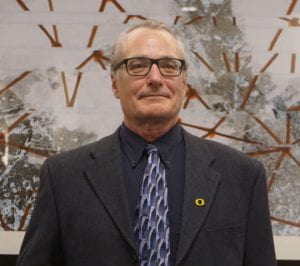By Bob Parker
After 20 years, I step down today as Executive Director of the Institute for Policy Research & Engagement. I’m delighted to hand the reigns over to Dr. Rebecca Lewis and Dr. Ben Clark who will take over as co-directors and lead the organization into its third generation. Josh Bruce will serve as Associate Director of Applied Research and will take on a lot of the program development and administrative functions that I previously had. Titus Tomlinson will lead RARE into year 27 and beyond. Michael Howard, Aniko Drlik-Muehleck, and Victoria Binning will keep the programs going and Julie Foster will continue to serve as the glue that holds the entire operation together.
I could not have asked for a more capable team to lead the organization into the future. IPRE/CSC has been my life’s work up to now—continuing the legacy is a gift to me from the entire IPRE team. What we built is unique in higher education and stands at the intersection of the three pillars of UO’s mission: education, research, and engagement. Our work is important and impacts students, organizations, and communities throughout Oregon and beyond while making significant contributions to basic research.
It has been a privilege to lead the Institute and to be part of the larger PPPM community. While there are way more people than I have the time to thank here, I want to specifically thank Rich Margerum head of PPPM for his support and insight. Working with the dedicated faculty and staff of PPPM has been a pleasure. Interaction with elected and appointed officials and community members is in education in itself and has kept me sharp all these years. Working with the hundreds of students has been a joy.
Alas, the adventure is not yet over. Circumstances have convinced me that a phased retirement is necessary—which probably doesn’t come as a surprise. Starting tomorrow, I’ll take on a new role as Director of Strategy and Technical Solutions for IPRE. A big part of my focus for the next two years will be on community and economic recovery from COVID-19. It’s going to be a long road to recovery and I’m ready to roll up my sleeves and continue to contribute to the overall effort. Moreover, I’ll continue my work with ECONorthwest.
I’ll close with a big thanks to all my colleagues in the fields of planning and public administration. The work we do is important and underappreciated. The people who do it are dedicated, courteous, knowledgeable, and fun. I look forward to continuing the journey.

